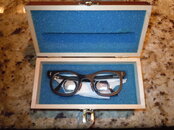- Messages
- 7,660
- Reaction score
- 4,717
- # of dives
- 200 - 499
I didn't go with multifocals either. I wanted the best possible fix (so I saved several grand). But having been nearsighted all my life, I really began to regret not being able to see anything up close in the detail that I was used to, readers are good for newspapers and menus but not great.

Those are my super-readers. I spent a bit of the money I saved.
Contact Designs for Vision, Inc to See What's Right About Made In America

Those are my super-readers. I spent a bit of the money I saved.
Contact Designs for Vision, Inc to See What's Right About Made In America




